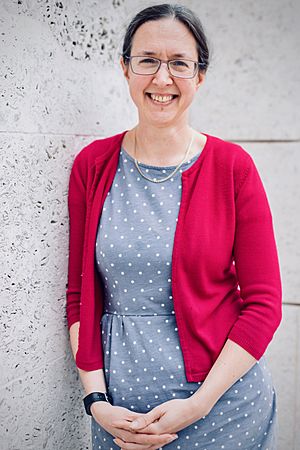Rachel Oliver (materials scientist) facts for kids
Quick facts for kids
Rachel Oliver
OBE FREng
|
|
|---|---|

Oliver in 2019
|
|
| Born |
Rachel Angharad Oliver
|
| Alma mater | University of Oxford (MEng, DPhil) |
| Awards | Royal Society University Research Fellowship (2006-2011) |
| Scientific career | |
| Fields | Gallium nitride Basic microscopy Quantum technology |
| Institutions | University of Cambridge Robinson College, Cambridge |
| Thesis | Growth and characterisation of nitride nanostructures (2003) |
| Doctoral advisor | Andrew Briggs |
Rachel Oliver is a brilliant scientist and a Professor at the University of Cambridge. She teaches about Materials Science, which is the study of how different materials are made and what they can do. Professor Oliver is also a fellow at Robinson College, Cambridge. Her work focuses on understanding and improving special materials called gallium nitride, which are used to make things like LEDs (the lights you see everywhere) and laser diodes.
Contents
Early Life and Education
Her School Days
Rachel Oliver went to the University of Oxford to study engineering and Materials Science. She also spent time working in metallurgy, which is the science of metals. For her final project, she studied materials used in electronics that work with light.
In 2003, she earned her PhD degree from the University of Oxford. During this time, she started working with gallium nitride under the guidance of Andrew Briggs. She used a special method called metalorganic vapour-phase epitaxy (MOVPE) to grow tiny structures called quantum dots. These dots are so small they behave differently from larger materials.
Research and Career
Starting Her Research
In 2003, Professor Oliver joined the University of Cambridge as a postdoctoral research fellow. This means she was a scientist who had finished her PhD and was doing more research. In 2006, she received a special award called a Royal Society University Research Fellowship. This allowed her to continue her important work at the University of Cambridge.
She studied how gallium nitride LEDs are shaped and how well they work. She found out what makes them efficient and how tiny flaws can affect them. She also received a grant to study other types of nitride structures.
Developing New Technologies
In 2011, Rachel Oliver became a lecturer at the University of Cambridge. She continued her research on gallium nitride materials for LEDs and laser diodes. Her work looks at how to design the tiny structures of these devices to make them perform better.
She has developed advanced ways to study these materials, including atom-probe tomography and scanning capacitance microscopy. These tools help scientists see and understand materials at a very tiny, atomic level.
Professor Oliver is also working on special quantum dots made from indium gallium nitride. These dots can create single photons of light, which are important for new technologies like quantum technology. Her team even created the first blue-light-emitting single-photon source. She also found a way to grow GaN quantum dots that glow ten times brighter.
Awards and Honours
Professor Oliver has received many important awards for her work. In 2019, she was elected a Fellow of the Institute of Materials, Minerals and Mining (FIMMM). She held her Royal Society University Research Fellowship from 2006 to 2011.
In 2021, she was elected a Fellow of the Royal Academy of Engineering. This is a very high honour for engineers in the UK. In 2023, she was given the academy's Chair in Emerging Technologies, which supports her work on new and important technologies.
In the 2025 King's New Year Honours List, she was awarded an OBE. This award recognized her great contributions to Materials Engineering.
Personal Life
Rachel Oliver is married to a cardiologist, who is a heart doctor. They have a son together.
 | Delilah Pierce |
 | Gordon Parks |
 | Augusta Savage |
 | Charles Ethan Porter |

